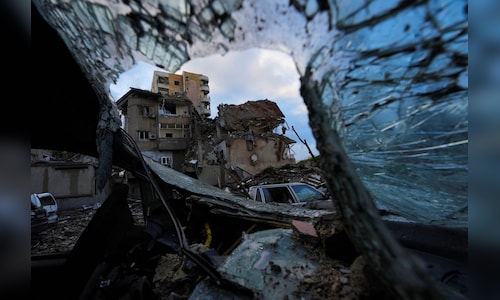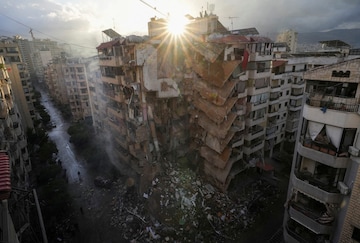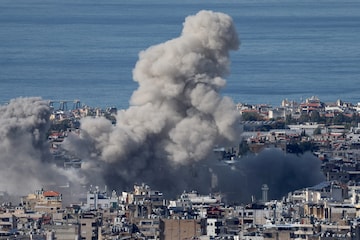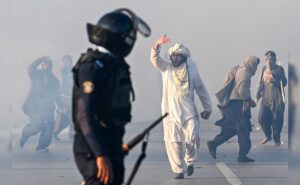
Israel’s Security Cabinet is expected to meet later on Tuesday, with Prime Minister Benjamin Netanyahu expected to chair the session, where the proposed agreement could be approved, according to media reports.
The path to a ceasefire
Israel and Hezbollah, the Iran-backed Lebanese militant group, have been engaged in a brutal conflict that erupted following the Gaza war in October 2023. While Israel has been preoccupied with fighting Hamas in Gaza, Hezbollah has opened a second front by launching attacks on northern Israel and engaging in heavy military operations along the Lebanese border.

Damaged buildings in Beirut’s southern suburbs in the wake of Israeli strikes. Image: Reuters
Earlier, Lebanese Foreign Minister Abdallah Bou Habib, speaking at a foreign policy conference in Rome, expressed hope that a ceasefire agreement could be finalised by November 26, thus ending one of the deadliest spillovers from the Gaza war.
As per Reuters, a senior Israeli official reported that the agreement could be ratified by US President Joe Biden and French President Emmanuel Macron, based on input from Lebanese officials and ongoing diplomatic talks.
Key details of the agreement
The ceasefire agreement, still being finalised, centres on several critical points that aim to bring stability to the region. According to officials, the key provisions include:
- Israeli troop withdrawal: Israeli forces are expected to pull out from southern Lebanon, where they have maintained a military presence. This would mark a significant shift in the region’s security dynamics.
- Lebanese army deployment: The Lebanese military would be tasked with securing southern Lebanon, an area that has long been a Hezbollah stronghold. It is expected that Lebanon’s army will deploy at least 5,000 troops within 60 days to ensure control over the region.
- Hezbollah’s border presence: Hezbollah would be required to cease its armed operations south of the Litani river, an area along Lebanon’s southern border with Israel. This would essentially demilitarise the region and reduce the threat of Hezbollah’s influence along the border.
These terms would mark a significant shift in the balance of power along the Israel-Lebanon border, with Lebanese forces taking on a greater role in maintaining order.
US and French involvement
Diplomatic efforts to broker the ceasefire have been led by international stakeholders, including the United States and France. On Monday, US National Security Council Spokesperson John Kirby confirmed that the two sides were close to finalising an agreement, although he cautioned that “nothing is done until everything is done.”
France has been instrumental in the discussions, with the French presidency noting that significant progress had been made. A deal could pave the way for joint statements by President Biden and President Macron, signalling international approval and support for the ceasefire.
The US has also signalled that it may assist in the reconstruction of Lebanon’s war-torn infrastructure, particularly in the southern regions destroyed by Israeli airstrikes. This would be part of a broader effort to help Lebanon rebuild, though challenges remain given the country’s ongoing economic crisis.
Security concerns and Israeli demands
Israel has emphasised the need for robust enforcement of the ceasefire terms. Defence Minister Israel Katz has stated that Israel will show “zero tolerance” toward any violations of the ceasefire, particularly when it comes to Hezbollah’s potential for re-armament or the resumption of attacks.
Israel’s government has made it clear that it will retain the freedom to carry out military operations in Lebanon if needed, particularly to protect its security and respond to threats from Hezbollah.
Israeli spokesperson David Mencer confirmed that the agreement would allow Israel to act in self defence against any imminent threats while ensuring that displaced residents in northern Israel can return home safely.
This demand for security guarantees has been a point of contention, with Hezbollah and Lebanese officials questioning Israel’s right to continue military operations in Lebanon under the terms of the ceasefire agreement.
While Lebanon has expressed opposition to such provisions, Israeli officials have stressed that the US has granted Israel permission to act against “imminent threats” in Lebanon if the need arises.

Smoke billows from Beirut’s southern suburbs after an Israeli attack. Image: Reuters
The human cost of the conflict
The conflict has taken a devastating toll on both Lebanon and Israel. According to Lebanon’s Health Ministry, more than 3,750 people have been killed in Lebanon, with over one million displaced, many of whom face the harsh realities of winter without shelter. Hezbollah’s rocket attacks on Israel have also resulted in civilian casualties, with 45 Israeli civilians and 73 soldiers killed as of November 2024.
For the people of both countries, a ceasefire would bring relief after months of constant violence. In Israel, approximately 60,000 people, who were forced to leave their homes in northern Israel due to Hezbollah’s rocket fire, would be able to come back.
In Lebanon, the widespread destruction caused by Israeli airstrikes has left large parts of southern Beirut and the surrounding areas in ruins, with Lebanon facing a major reconstruction challenge.
The role of US diplomacy
The Biden administration has made it clear that resolving the Lebanon conflict is a priority as part of broader diplomatic efforts in the Middle East. US Envoy Brett McGurk is set to meet with officials in Saudi Arabia on Tuesday to discuss how the Lebanon ceasefire could serve as a catalyst for renewed peace efforts in Gaza.
With the US administration in its final months, securing a ceasefire deal in Lebanon could be seen as a significant diplomatic achievement before President Biden’s term concludes.
As Israel and Hezbollah approach a potential ceasefire, the outcome remains uncertain. Both sides have suffered tremendous losses, and while a deal seems within reach, the complexities of enforcing the terms and ensuring lasting peace will require careful diplomacy and international cooperation.
ALSO READ: In Pics | US companies with Mexican ties brace for impact of Donald Trump’s proposed trade tariffs



